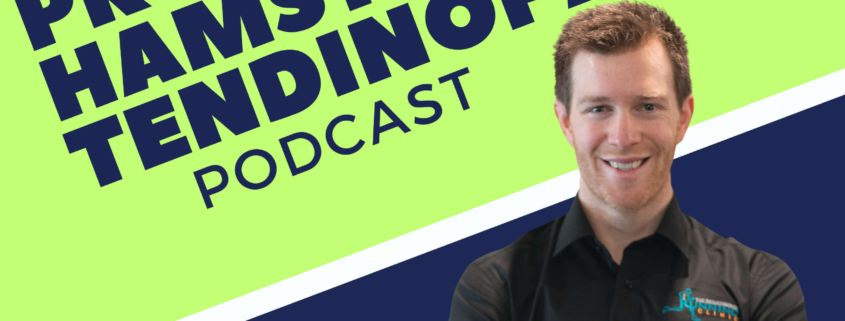The Relationship of Sleep and Cortisol in Running Injuries
Understanding the Connection Between Proximal Hamstring Tendinopathy and Sleep
Proximal Hamstring Tendinopathy (PHT) can be a debilitating condition for athletes and non-athletes alike. In this episode, we explore the relationship between PHT, stress, and cortisol, with a particular focus on the importance of sleep. As we delve into this topic, you’ll gain valuable insights into how sleep quality affects injury risk, pain levels, and recovery. Let’s embark on a journey to better understand the crucial role of sleep in managing PHT.
Meet Brodie Sharp: Your Guide to PHT
Before we dive into the fascinating connection between PHT, sleep, and cortisol, let’s meet the host of this podcast, Brodie Sharp. He’s an online physiotherapist and a recreational athlete. Brodie is the creator of the Run Smarter series and, interestingly, a chronic PHT battler himself. He’s on a mission to help you grasp the complexities of this condition, debunk common misconceptions, and equip you with evidence-based treatments. Whether you’re a seasoned athlete or simply an individual looking to overcome PHT, Brodie’s insights will empower you to take the right steps.
The Role of Sleep in Injury Risk
In this episode, we’ll explore the profound impact of sleep on injury risk, focusing on its link to PHT. Studies have shown that insufficient sleep can significantly increase the likelihood of injuries. For example, adolescents who sleep less than eight hours per night are 70% more likely to report an injury within the following week compared to those who get sufficient rest. This finding underscores the importance of sleep for injury prevention.
Athletes, in particular, can benefit from prioritizing their sleep. Research reveals that athletes who achieve the recommended amount of sleep during weekdays reduce their odds of injury by 61%. Moreover, sleep duration is closely tied to the immune system. Getting less than seven hours of sleep makes individuals nearly three times more likely to develop an infection compared to those who enjoy more extended rest. Falling ill can disrupt training programs and races, highlighting the crucial role of sleep in athletic performance.
The Sleep-Repair Connection
Have you ever wondered why sleep is essential for recovery? Sleep is the time when your body’s immune and endocrine systems kick into action, restoring your body from the day’s activities. Think of it as your body’s repair phase, and this becomes even more critical as you increase your training intensity. Endurance athletes, in particular, require more time for recovery as they push their bodies to their limits. Healthy adults generally need seven to eight hours of sleep, but endurance athletes need nine to ten hours to reach their full potential.
Sleep and Athletic Performance
To drive home the importance of sleep, consider a systematic review titled “Sleep Interventions Designed to Improve Athletic Performance and Recovery.” The study found that sleep extension, in which you lengthen your usual sleep duration, had the most beneficial effects on subsequent performance. This aligns with previous research emphasizing the critical role of sleep in various aspects of athletic performance and recovery.
Sleep affects numerous performance markers, both physical and emotional. Insufficient sleep can impair submaximal exercise performance, anaerobic power, cognitive function, mood, and overall health. It can even lead to muscle atrophy, affect muscle glycogen stores, and impair maximal muscle strength for compound movements, such as running.
The Interplay Between Cortisol and Sleep
Now, let’s explore the interwoven relationship between sleep and cortisol, a stress hormone. Cortisol plays a crucial role in the body’s stress response, releasing energy in situations of acute stress. However, chronic stress can lead to excessive cortisol production, resulting in widespread inflammation and pain. This is where the connection between sleep and cortisol becomes evident. Chronic stress can trigger elevated cortisol levels, causing sleep disturbances. Insomnia, in particular, is associated with elevated cortisol levels.
To visualize this connection, imagine a room with a lit match as a pain signal. Cortisol is the flammable gas in the air. The more cortisol you have in your body (the more gas in the room), the more intense the pain signal becomes. Chronic stress and elevated cortisol levels can exacerbate pain and disrupt sleep, forming a vicious cycle that affects recovery and injury management.
Coping Strategies for Chronic Stress
Chronic pain and persistent stress often go hand in hand. Chronic pain can lead to psychological stress, which can trigger the release of cortisol. Coping strategies and cognitive appraisals can help mitigate the secretion of cortisol and reduce the risk of chronic pain. It’s essential to address both the physical and psychological aspects of pain and stress to break the cycle.
Tips for Improving Sleep Hygiene
To improve sleep quality and reduce the risk of injury, consider implementing these tips:
- Switch off electrical devices one to two hours before bedtime.
- Avoid alcohol and large meals one to two hours before sleep.
- Maintain a dark, cool room (around 18 degrees Celsius).
- Be mindful of your caffeine intake, especially in the hours leading up to bedtime.
- Establish a consistent sleep pattern.
- Consider napping between 1 pm and 4 pm to make up for lost sleep, without disrupting your circadian rhythm.
Conclusion
In this podcast episode, we’ve unveiled the significant relationship between sleep, cortisol, and proximal hamstring tendinopathy. Adequate sleep is not only essential for injury prevention but also for overall athletic performance and recovery. Chronic stress, excessive cortisol, and sleep disturbances can form a harmful cycle that hinders your progress.
By understanding this complex interplay, implementing sleep hygiene practices, and adopting coping strategies for stress, you can take control of your rehabilitation journey and move towards a pain-free future. Remember, knowledge is power, and equipping yourself with the right knowledge can make all the difference in your path to recovery and peak performance.

